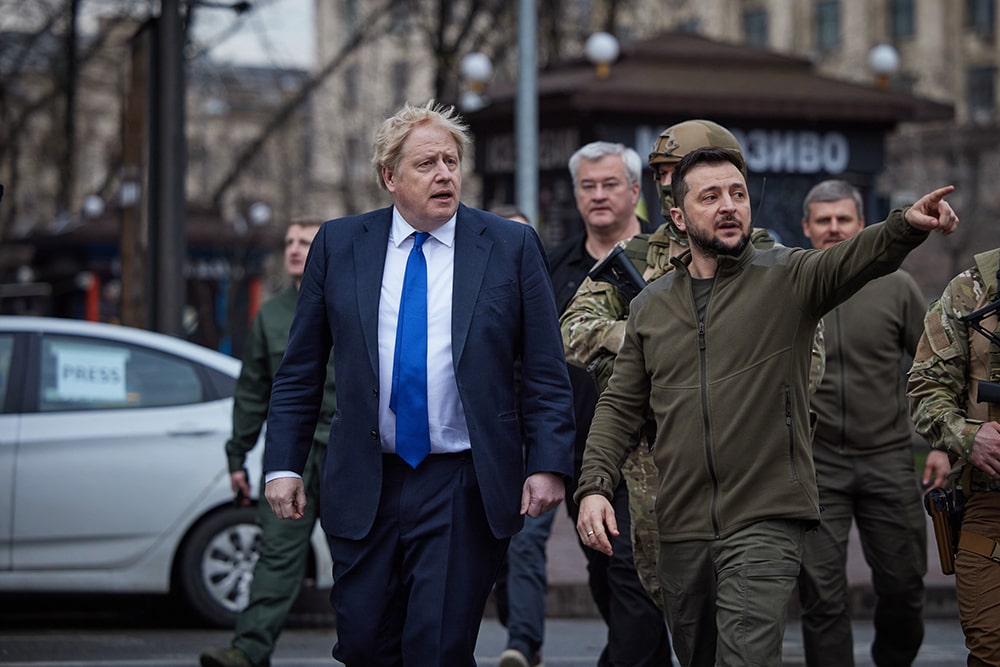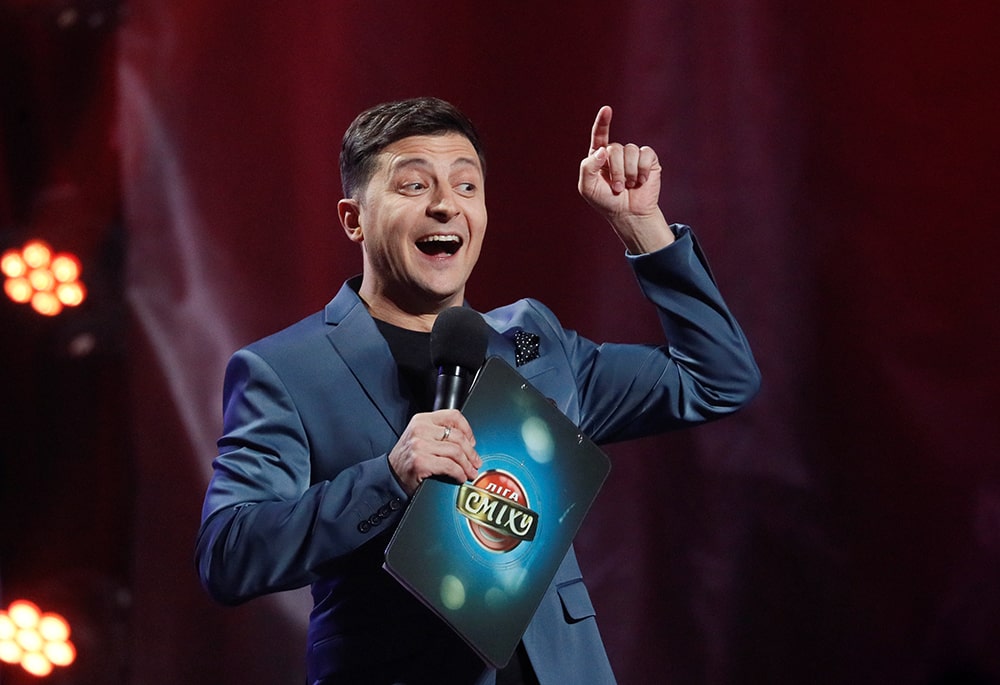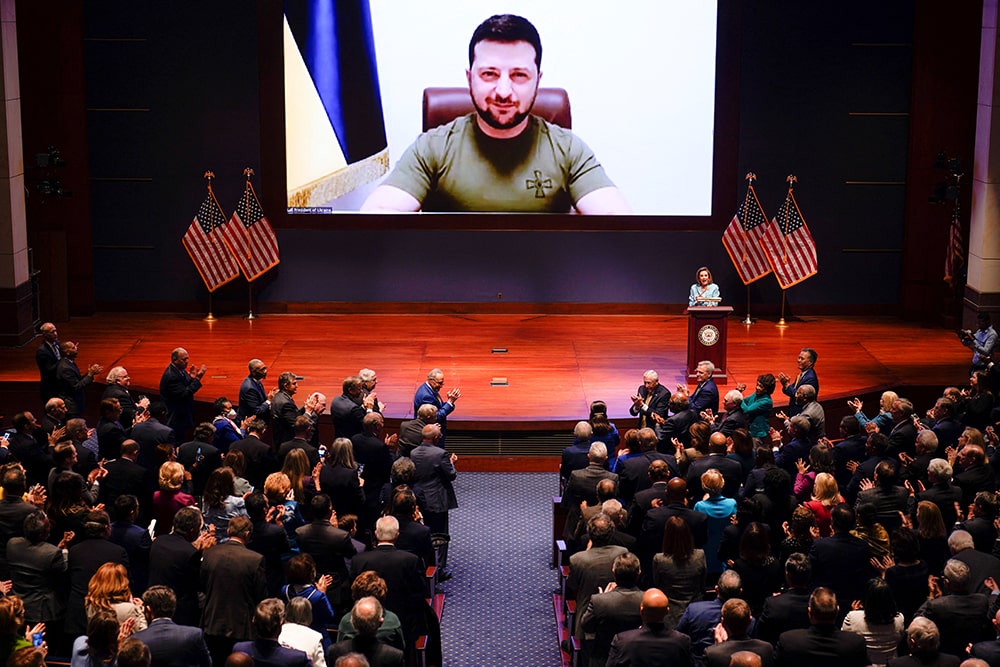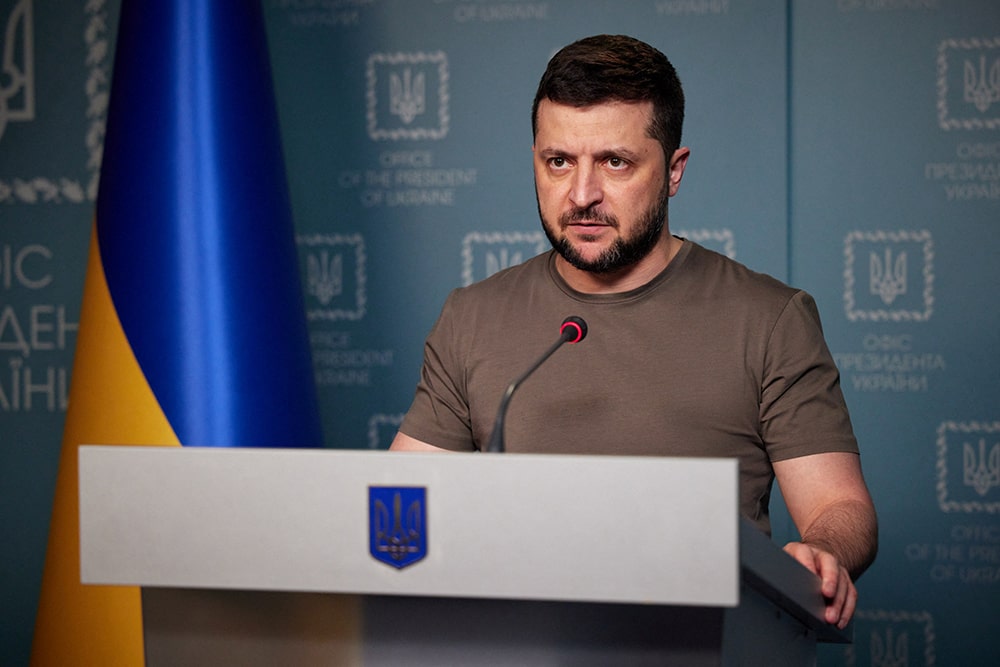“Of two bad people, you choose the lesser evil. And you do that for 25 years in a row. And you know what’s interesting? Nothing will change . . . And then these [bad people] come to power. They lie and steal, steal and lie—the accents are different, the meaning is the same. And no one cares . . . If only I would be sent there for one week, if it were possible. I would teach them a lesson.”
From a monologue of Vasily Goloborodko, the fictional president of Ukraine,
played by Volodymyr Zelenskyy, on the Ukrainian TV series “Servant of the People.”
>> A Profile in Policy: Read more from Ksenia Svetlova
Shortly after Volodymyr Zelenskyy won the election in 2019 and became president of Ukraine, the first telephone conversation took place between him and Russian President Vladimir Putin. To illustrate the phone call, the Kremlin website used a photo of Zelenskyy from the “Servant of the People” TV series in which he starred, either by mistake or with some hidden meaning. The residents of the Kremlin drew three conclusions on Ukraine and its newly elected president, a former comic actor: The actor will never mature into a real politician; he will never be able to withstand Russian might; and he is not the kind of leader who will stubbornly fight for his people and his land. All three assumptions were dead wrong.
Putin was not the only one who made assumptions about Zelenskyy. American leadership offered him safe asylum in the West, assuming that he would not want to risk his life or to fall into Russian captivity (clearly, after the pitiful conduct of the Afghanistan leadership, American expectations were rather low.) His answer will go down in history: “I need ammunition, not a ride.” Unnamed Israeli sources were quoted in the Hebrew press snidely stating that “Zelenskyy fell in love with his new role, being a hero.”

British Prime Minister Boris Johnson meets Ukraine President Volodymyr Zelenskyy as he visits Kyiv. Photo credit: EYEPRESS via Reuters Connect.
And yet, the man who spent 20 years of his life making other people laugh and who built his political campaign around his successful satirical show “Servant of the People,” a president who was thought to be a tragicomical figure, stood tall in the face of the Russian aggression against Ukraine. Over a month into the war, President Zelenskyy is being spoken of as a leader in the mold of Winston Churchill and other remarkable world leaders who led their nations courageously during wars and conflicts. Zelenskyy’s case is even more fascinating, insofar as he personifies the new generation of leaders in post-Soviet countries—those who were born in the USSR but would like to take their countries as far away as possible from the Soviet experience.
Born in the USSR
Just like Vladimir Putin, Volodymyr Zelenskyy was born in the USSR, although he is a generation younger (Putin was born in 1952, Zelenskyy in 1978). They probably read the same books in their childhoods (the Soviet curricula did not change significantly over the decades), ate the same ice cream, and enjoyed the same iconic Soviet movies, such as “The Elusive Avengers” that told the story of the battles of the Red Army during the civil war in Russia. Both men grew up steeped in Russian culture—Zelenskyy started improving his non-existent Ukrainian only in 2017. But at that point their shared experience ends. Putin was born and raised in a tough neighborhood of Leningrad (today St. Petersburg), the son of a poor family bearing the scars of the Great Patriotic War. Zelenskyy had spent his childhood in the small city of Krivoy Rog in Ukraine. He was born to a family of Ukrainian Jews, the son of a scientist and an engineer—A classic Soviet middle-class family.
Since his early childhood, Zelenskyy experimented with acting, and already during high school he became famous on a local satirical TV show, in Russian, where teams competed by giving funny answers to questions and acting in prepared sketches. Zelenskyy grew up and matured during the turbulent years of Perestroika, when the Soviet empire collapsed, about which the young Zelenskyy had probably made many jokes. Vladimir Putin, 26 years older, had experienced Perestroika very differently. At that time, Putin was already a KGB officer who served in Dresden, looking after Soviet interests in Eastern Germany and beyond. When the Berlin Wall came down, he was in his office in Dresden, burning top-secret papers, wondering what would become of him and his peers.

Volodymyr Zelenskyy hosts a comedy show in 2019. Photo credit: REUTERS.
Later Putin said that the demise of the USSR was the “worst geopolitical tragedy of the 20th century.” He has often spoken highly of the glory of the Soviet empire, stressing the heroism of the Red Army and the grandeur of the state that developed nuclear weapon and launched spaceships, but lacked diapers for babies. Zelenskyy, on the other hand, has accused the USSR of being one of the perpetrators of World War II and mentioned the lack of respect for the law, which in his opinion developed during the Soviet era. In the midst of the war he spoke about the importance of European values, while the other Vladimir has ridiculed Europe, and his Minister of Culture Vladimir Medinsky has insisted that there are no “European values” whatsoever. Both leaders of Russia and Ukraine were born in the USSR, but they could not be more different from one another.
The Protest Candidate
How did Volodymyr Zelenskyy, the successful actor, comedian, and TV producer, become president of Ukraine? What made him so special and different from the rest of the candidates (there were 44) in the fateful 2019 elections in Ukraine, allowing him to beat the acting president, the billionaire Petro Poroshenko? Although Zelenskyy was not officially involved in the political process prior to establishing his own party, he certainly had a say about what was happening in Ukraine since it had become a sovereign country. He was critical of corruption and attacked it fiercely on his TV show. He despised the rule of mighty oligarchs and their unchecked power, and he was shocked by Russian aggression against his country in 2014, when the war in Donbass first broke and Crimea—the pearl of the Black sea—was annexed. At that time he travelled to the front and gave concerts to Ukrainian soldiers, and his sharp criticism of Russian policy caused friction between him and his Russian partners.
The war that was launched by Putin in 2014 had forced many Ukrainians to reassess their beliefs and reshape their identity; as any war or aggression against a group of individuals, it highlighted the differences between the attacker and the attacked. Perhaps, in preparation of his future political campaign, Zelenskyy, who was born in the Eastern part of Ukraine, mostly populated by Russian speakers, started to brush up his Ukrainian. According to law, a president of Ukraine must speak Ukrainian. At first glance, this condition looks peculiar, but given the Soviet practice of undermining the local languages in the republics for the sake of the Russian language, and given that almost 40% of Ukrainian citizens do not speak Ukrainian, it makes sense.
In 2015 Zelenskyy’s show “The Servant of the People”—featuring a history teacher, Vasily Goloborodko. who ends up being elected president—became an instant hit. In a country severely hit by the plague of corruption, a slogan such as “The goal is that a history teacher will live like a president, and a president shall live like a history teacher” seemed revolutionary. The servant of the people struggled with corrupt oligarchs and their yes-men at the Ukrainian Rada (parliament), made jokes about Putin, and spoke about the Ukraine of his dreams (Zelenskyy’s dreams?).

Ukrainian President Volodymyr Zelenskyy delivers a virtual address to Congress at the Capitol. Photo credit: REUTERS.
After three successful seasons, Volodymyr Zelenskyy became the ultimate protest candidate. He used his popularity against other candidates’ money and influence. In his campaign, he focused on combatting corruption and poverty, while the question of relations with Russia, the status of the Russian language, and the future of Crimea were secondary. Initially supported mostly in the cities of Eastern Ukraine, he soon was endorsed in the rest of the country. People who voted for him voted against corrupt and greedy politicians who lied to them and prevented their country from developing.
The meteoric rise of Zelenskyy—a civilian who was never part of any security organization—could happen anywhere in the West, but not in Putin’s Russia. Instead of seeing Zelenskyy as an elected leader who built a skillful campaign and managed to get elected by winning over the hearts of the people, the Kremlin saw him as a weak link in the chain, who would be unable to resist the pressure from Moscow—personally, politically, or militarily. Autocracy does not understand democracy and instead ridicules it and its many faults, without ever grasping democracy’s essence—the free will of the people to choose their elected officials and get rid of them if they fail.
“The Fight Is Here; I Need Ammunition, Not a Ride”
In the weeks prior to February 24, President Volodymyr Zelenskyy repeated several times that he did not believe that a large-scale Russian war against Ukraine would commence. On a few occasions, he and his ministers had criticized the Western governments for evacuating their diplomatic missions in Ukraine. Zelenskyy was certainly updated by the Americans, the British, the French, and the Germans who thought that a full-scale war was just around the corner, yet he refused to believe that Ukraine’s neighbor would cross the red line and turn from hybrid warfare to bombing residential quarters and maternity wards.
Was Zelenskyy really shocked when Russian troops crossed the border on the night of February 24 and sirens were heard all over Ukraine? Was he still repeating his mantra that war was not possible just to highlight the peaceful intentions of his own government and to reassure the Russians that Kyiv was not about to fight, not in Donbass, or anywhere else? Time will tell.

Ukraine’s President Zelenskyy addresses the Ukrainian people in Kyiv. Photo credit: via REUTERS.
In any case, even if Zelenskyy was absolutely sure that the Russians would viciously attack the cities of Ukraine, could he evacuate the entire country beforehand? Probably not. When the moment came, he did what only a determined and noble leader could do—he stayed in his city, with his people, his soldiers, and his family. Zelenskyy could have run away like Afghanistan’s President Ahmad Ghani, or relocate to a nearby EU country like Belarusian leader Sviatlana Tsikhanouskaya. Western leaders offered him that option, as they feared for his safety and assumed that Ukraine had no chance against Russia. It no longer was a satirical TV show but a brutal reality within which Zelenskyy had to make his choice.
Zelenskyy stayed in Kyiv and continued doing what he does best: talking. He addressed the nation and inspired Ukrainian citizens, soldiers, and volunteers. He urged Western leaders to help Ukraine and explained why the war against Ukraine was, in fact, a war against the collective West. When Vladimir Putin looked alienated at his ridiculously long table, Zelenskyy was taking selfies with his team at Bankovaya Street in Kyiv, in the heart of his homeland. During one month of war, Putin never visited the front and never met his soldiers, who were soon to be killed, captured, injured, or maimed on the battlefield. Instead, Zelenskyy was the one to address them, saying “You still have a chance not to get killed. Just go home.”
While Vladimir Putin had created a concrete wall around him, similar to the Berlin Wall, Volodymyr Zelenskyy was reaching for the future. Today, as the fighting in Ukraine is still intense, and the people of Ukraine are still dying in Russian attacks, starving for bread and water, and fleeing their country as refugees, there is still no way to know how this story will end. Given that no Western intelligence believed that Zelenskyy and his army would last for so long, almost any scenario that would include the end of hostilities and Russian retreat might be perceived as a “David” victory over a Russian Goliath. And yet, the reality today is grim; there is no certainty that the Russians will withdraw from the occupied Ukrainian territories anytime soon, and it is unclear how long the war will last and when Ukrainians will be able to start rebuilding their country.
Zelenskyy might win the war (or last incredibly long), but he might lose the political battle afterwards, especially if he will be forced to accept painful compromises. In his show “Servant of the People,” President Goloborodko was impeached and then struggled to win over the love of his people, after pushing for unpopular reforms. But regardless of future political developments, President Zelenskyy had already made it to the pantheon of fame of the world’s leaders. He will be remembered as an actor who refused to be intimidated by a KGB agent, as a leader of a country that fought courageously against the Russian bear, and as a Ukrainian David who stood up to a Russian Goliath, whose fancy weapons proved to be ineffective against the wit and the free spirit of the weaker fighter.

